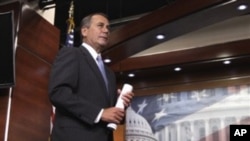The speaker of the Republican-controlled U.S. House of Representatives, John Boehner, has said that the United States will not default on its debt, but that the Obama administration must cut government spending. Experts say the U.S. government's debt limit could be reached as soon as March 31, and Congress must vote to approve raising the debt ceiling in order for the United States to take on more debt.
Republicans swept last November’s mid-term elections nationwide with promises to crack down on federal government spending in order to reduce the spiraling national debt. Some fiscally-conservative Tea Party Republican lawmakers have threatened to vote against raising the U.S. debt ceiling of $14.29 trillion when that limit is reached. Experts say that will likely happen sometime between late March and mid-May.
But in an interview with Fox News Sunday the new Republican House speaker, John Boehner, said a U.S. default on its financial obligations would be a disaster and is "not even on the table." "That would be a financial disaster not only for our country, but for the worldwide economy. Remember, the American people on election-day said ‘we want to cut spending and we want to create jobs.’ And you can't create jobs if you default on the federal debt," he said.
Echoing other Republican lawmakers, Speaker Boehner made clear that Democratic President Barack Obama must be willing to make significant cuts to the federal budget. "And if the president is going to ask us to increase the debt limit, then he's going to have to be willing to cut up the credit cards. We have got to work together, by listening to the American people, and reducing these obligations that we have," he said.
Boehner said the House Appropriations Committee will come up with targeted budget cuts in a proposal set to come to the House floor around mid-February. Last week, the House voted on a non-binding measure to cut government spending by 20 percent to 2008 levels.
President Obama has not called for such large budget cuts, but has called for a five-year freeze on non-discretionary government spending (government spending that is required by law). In his State of the Union address last week, the president said there will have to be cuts in some areas, but also called for government investment in education, innovation and infrastructure to keep the U.S. competitive on the world market.
New White House Chief of Staff William Daley told CBS News’s Face the Nation that even talk of a default on U.S. financial obligations could scare investors in government bonds and the stock market. "No one wants the government to go into default. We have seen governments around the world go into default, and considering we are just beginning to come out of this great recession we were in, any thought, any concept of trying to use the debt ceiling as some sort of threat or leverage will run the possibility of spooking the markets," he said.
Benton Ives of Congressional Quarterly/Roll Call says there is widespread agreement among economists that a showdown on the debt ceiling would be bad for the economy.
"Given the concern that it could cause, you know a, for example, rapid decline in the Dow Industrial Average, and the resulting losses for stockholders, the political leadership of the Republican Party has no interest in seeing that happen. So he really has got to start digging his heels in and trying to convince some of his members, including a lot of these new freshman Tea Partiers that this is not the kind of brinksmanship that is going to be good for the party long term," he said.
Apart from a vote on raising the debt ceiling, Congress will also have to pass a budget to fund the federal government for the current fiscal year by March 4 - another opportunity for either compromise or a showdown between Democrats and Republicans on government spending.
House Speaker Boehner: US Will Not Default on Debt
- By Cindy Saine




